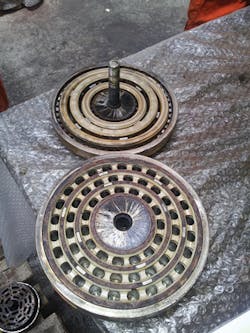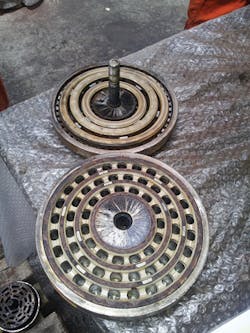Compressor valve addresses maintenance challenges in remote locations
Jean-Louis Alderweirelt
Compressor Products International
Perhaps the most valuable asset in an offshore or remote facility is sustainability. Not necessarily in the environmental sense, but in the idea that there is great value in products that require little maintenance in order to keep functioning at a high level. From oil rigs to remote refineries, outside repairs and maintenance mean downtime and lost production. These remote operations often do not have the capacity to perform highly skilled maintenance and refurbishing. They have limited staff, space and time to ship equipment to get serviced efficiently and safely.
However, in the Congo in 2009, discussions began between plant workers and a global valve manufacturer around developing a product that has greatly improved the offshore and remote operations industry. And it signals a shift in equipment specific to remote locations, focusing on quick and easy maintenance.
It was in this context that the Hi-Flo RS valve from Compressor Products International (CPI) was introduced. CPI says that the valve stands apart from other products in remote and offshore applications because of its replaceable PEEK seat plate. Workers do not need special skills or tools to refurbish the valve when it needs maintenance, and it does not need to be shipped off-site for maintenance.
CPI says that deployment of the Hi-Flo RS valves on a platform offshore the Congo helped reduce maintenance efforts and downtime. (Courtesy Compressor Products International)
The journey began at a remote facility in the Congo operated by a well-known, global oil and gas company. Over the course of several years in the Congo, CPI worked with the customer to test and develop industry momentum for the Hi-Flo RS valve. The customer ran a test of the Hi-Flo RS valves on one of their nine compressors located on an offshore platform, with satisfactory results. The company then decided to outfit all nine of their compressors with CPI Hi-Flo RS valves, reducing maintenance efforts and downtime. By 2016, all nine of their compressors were fully equipped with the new product, and the momentum was building.
This oil and gas company did not stop with just equipping their facility in the Congo. After sending a recommendation to one of their other facilities in nearby Gabon, that facility also made the switch to the Hi-Flo RS valve on several of their compressors.
A representative from this particular customer summed up their satisfaction with the valves: “The CPI Hi-Flo RS is the response to our problems. We don’t need to re-machine or use special tooling for maintenance. Furthermore, we do not need to keep complete valves in stock — only rebuild kits. We have also reduced the unscheduled shutdown time.”
A product like this thrives in remote environments, because it can receive the maintenance it needs right on site. Otherwise, the staff would have to engage in the extra work of removing the valve, shipping it back to shore, and then waiting for a highly trained engineer or mechanic to perform the maintenance. This refurbishing effort is far more extensive, requiring several parts of the valve to be machined or manually replaced. Then it gets shipped back to the facility and reinstalled. That entire process leads to more downtime, lower productivity, higher risk of issues related to shipping and more hassle for the facility operator.
To refurbish the valve, workers simply use the valve refurbishing kit from CPI—often stored on the platform—to clean the valve, open it up and then change the replaceable seat plate. This also cuts down on labor costs because a facility does not need to staff specialized workers to perform this kind of maintenance. Any worker can perform this task quickly and effectively.
Because the new seat plate is at the same dimensions as the original, there is no need to make the complicated adjustments using shims and gaskets when reinstalling the valve.
In fact, maintenance that could take days or weeks for other types of valves can be performed on a Hi-Flo RS valve in as little as five minutes. That kind of simplified process is invaluable.
Once the valve crossed the border into the coastal country of Gabon, the facilities from another renowned oil and gas producer in Gabon heard about it and showed interest in this type of valve for their remote facility. The location was near the coast, but still in a remote area and difficult to access. They immediately saw the benefit of a valve like this and added it to their compressors.
That first customer in the Congo was not just the first that used the Hi-Flo RS valve. They also had a hand in the inception of the product. They were using regular disk valves from CPI for many years, and they found that they were facing significant challenges with the machining and maintenance of the valves in their remote location. Simply put, they did not have the properly equipped maintenance workshops on location, and could not perform maintenance on the valves in a timely manner. At the same time, CPI desired to improve and evolve the maintenance aspect of their compressor valves, and the feedback from the company came at an opportune time. The result was a product without a peer in the compressor marketplace.
Today, the Hi-Flo RS valve is still in its infancy when it comes to its potential on the global scale. Several large-scale operations have made the switch, but this product—and the concept of improved self-sustaining operations in remote locations—can impact the entire offshore industry.
By dramatically improving the refurbishing process for valves and compressors, the effects can truly change the daily operation of an offshore or remote operation. It requires no training or special tools, no shipping and virtually no downtime, leaving the staff to dedicate more time to efforts focused on production and output. •

